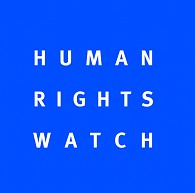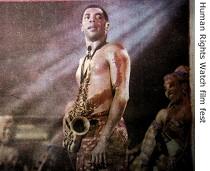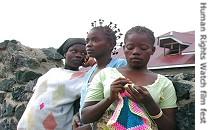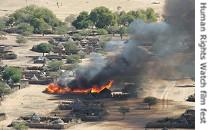2007年VOA标准英语-Human Rights Watch Film Festival Aims to Put Hu
搜索关注在线英语听力室公众号:tingroom,领取免费英语资料大礼包。
(单词翻译)
By Mona GhuneimNew York
04 July 2007
Three documentaries featured at the annual Human Rights Watch Film Festival in New York this year aim to put a human face on the issues and crises facing Africa today. From New York, VOA's Mona Ghuneim has the story.
 |
A profile of a Nigerian political activist2 and singer, a portrait of a Congolese woman who was raped4 by renegade militia5, and an account of an American witness to tragedy in Sudan give intimate and sometimes disturbing details.
Director Dan Ollman says what is going on in Africa is not pretty and that viewers should be incensed6 when they watch these films. He says that for his film, he spent time getting to know the Nigerian singer Femi Anikulapo Kuti, and the more he learned, the more he understood the suffering.
"I got the opportunity to speak with him one-on-one and learn more about the politics," Ollman said. "While he's talking about it, you're like 'It can't be that bad. There's no way.' And then you go there and see it first hand, and if you're not outraged7."
 |
| Scene from Suffering and Smiling |
In the film, Femi speaks about his disappointment with the Nigerian people and their lack of activism, but he also blames foreign governments for poor governing in regards to African issues.
"They do not understand the gravity of their governments supporting bad governments in Africa, and they do not understand the gravity of their nonchalant-ness towards what's going in Africa after all these years," Femi says in the film.
"Now wrong information scatter8 your head. You reject your culture for Western senses. Bringing shame to yourself and your country nation. Black man today done lost himself. Yeah yeah yeah yeah," he adds.
 |
| Scene from Lumo |
"There is no more effective way to terrorize an entire population. We tend to think in this country (United States) of terrorism as something that is done with car bombs or with suicide bombs, but in much of the world, terrorism is done with rapes9."
The film goes on a human journey with Lumo. At a charity hospital in eastern Congo, Lumo awaits operation after operation. As a result of the rape and assaults on her body, she suffers from fistula - a condition that makes her incontinent and threatens her ability to have children. She endures five operations during her two-year stay at the hospital.
One of the film's directors, Nelson Walker, says concentrating on one "character" at the hospital personalizes the disaster. He says Lumo's story became a personal one for him and his team, and the film reflects the close bond they established with Lumo.
"We really wanted to put a human face on the crisis and it's our hope that audiences here in the U.S. really connect with Lumo and use that as momentum10 to really begin to see what's going on over there," Walker explains.
 |
| Scene from The Devil Came on Horseback |
Seen through the eyes of American witness Brian Steidle, the film follows him during his work as a military observer with the African Union. Steidle documents humanitarian13 abuses in Darfur, and then takes his message, as well as brutal14 photographs, back home to show the people and government of the United States.
The filmmakers say Steidle's genuine concern allowed him to connect with the people of Sudan. In the film, several refugees tell him their thoughts on the government and situation in Darfur. But, he says, they are scared and don't reveal their identity for fear of a backlash.
"They fear if they speak out against the government that they will be imprisoned15. I was talking to two individuals confidentially16 the other day," he says. "They say that there is no gray area. It is either genocide or not. Are people being killed because they are Africans and not Arabs? Yes."
Steidle says he is afraid that the world will be hearing about Sudan for a long time to come. He says decisions are not being made fast enough and there is too much squabbling over definitions.
But one thing all three films have in common is the way they define and depict17 the "human" in human rights.
 收听单词发音
收听单词发音 




